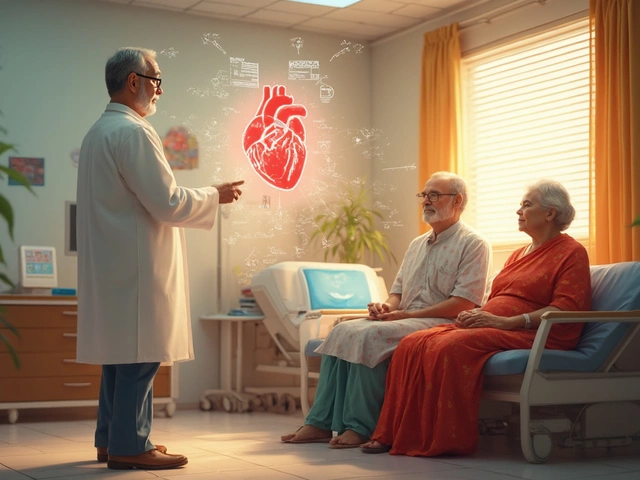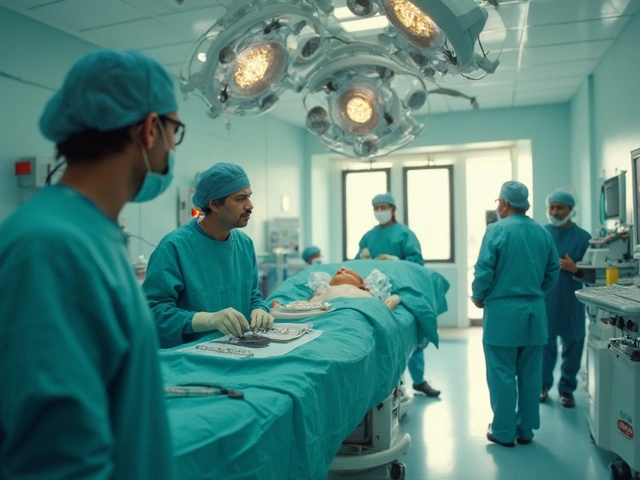- Home
- Cardiology
- What Age Should You Avoid Open-Heart Surgery?

What Age Should You Avoid Open-Heart Surgery?
Figuring out the perfect age to have open-heart surgery is tricky, right? As we get older, surgeries come with a higher risk, but not getting the right treatment also has its own dangers. So where do we draw the line?
In general, as people get older, their bodies don't bounce back as quickly from major operations like they did when they were younger. The heart and body's resilience starts to diminish, and this can make recovery a lot harder if you're, say, past your mid-70s or 80s. But that's not a hard line for everyone.
It mostly comes down to how fit you are, your overall health, and how complex the surgery is. A 75-year-old with a healthy lifestyle might have a better shot at a smooth recovery than someone younger but with multiple health issues. Crazy, right?
- Understanding the Risks
- Age-Related Complications
- Alternatives to Surgery
- Making Informed Decisions
- Recovery and Quality of Life
Understanding the Risks
Diving into the risks of open-heart surgery can feel overwhelming, but knowing the facts helps you face it head-on. At its core, open-heart surgery is a big deal. You're talking about cracking open the chest to fix serious issues with the heart. That said, it’s crucial to understand what you're up against before going in.
Why Age Matters
As you age, the body becomes less resilient. Think of your heart like a car engine that has been chugging along for decades. With wear and tear, things just don’t run as smoothly. The older you get, the longer it might take to recover from major operations, and the chance of complications increases. Studies have shown that patients over the age of 75 have higher mortality rates post-surgery.
Common Risks and Complications
Now, let's get into the nitty-gritty of what can happen on the operating table. Here are some common risks and complications associated with open-heart surgery:
- Infection: The risk of infection goes up with age, especially when healing takes longer.
- Bleeding: Excessive bleeding can occur during or after surgery.
- Stroke: There's a risk of blood clots, which could lead to a stroke.
- Heart Attack: Paradoxically, the stress of surgery might cause a heart attack, particularly in older patients.
- Lung and Kidney Issues: Post-surgery, the heart needs time to get back to peak function, impacting other organs.
Statistical Insight
For those of you who like the numbers, here's a bit of data to chew on:
| Age Group | Mortality Rate |
|---|---|
| Under 60 | 2.5% |
| 60-75 | 4.1% |
| Over 75 | 9.8% |
Pretty stark, right? This table highlights why age is such a crucial factor in deciding whether or not to go through with open-heart surgery. But hey, it’s not all doom and gloom. With modern medicine, there are always safer and smarter ways to do things.
Age-Related Complications
It’s no secret that as we age, our bodies just don’t operate like a finely-tuned machine anymore. When it comes to undergoing open-heart surgery, the stakes are even higher. Plus, when you’re past a certain age, several factors can elevate the risks involved.
Reduced Healing Ability
The older we get, the slower our bodies heal. This means longer recovery times and higher chances of complications like infections. It’s like your body hits the brakes on healing when you need it to floor the pedal. A slower recovery can be frustrating and sometimes, a bit discouraging.
Existing Health Conditions
You know how sometimes you just can’t hang out with certain friends without drama? Age brings along its own unfortunate companions like diabetes, hypertension, or COPD. These conditions can complicate surgery and recovery, sort of like tangled headphones you’ve got to deal with before a workout.
Impact on Cognition
Here's something tricky: surgery, especially when it involves anesthesia, can affect your brain. Research has shown that older folks might face cognitive decline post-surgery. Memory problems or confusion aren't rare, so it's a cost-benefit analysis situation.
“Elderly patients often face higher risks during surgery, but personal health status often outweighs chronological age as a predictor of outcomes.” – Dr. Michael Wood, Cardiac Surgeon.
Risk of Mortality
Now, I hate to be a downer here, but there’s a higher risk of mortality in older patients undergoing open-heart surgery. The numbers back this up, with stats showing a significant increase in risks for patients aged 75 and over. It’s a sobering reminder that surgery isn’t something taken lightly.

Alternatives to Surgery
Thinking about skipping open-heart surgery? You're not alone, and there might be options out there that are less invasive. It's always a good idea to consider other treatments if surgery seems a bit too risky given your age or current health condition.
Medication Management
Sometimes just tweaking your meds can make a big difference. Heart medications can help manage symptoms or improve heart function. Your doc might suggest beta-blockers, ACE inhibitors, or statins, which can help ease the strain on your heart.
Minimally Invasive Procedures
If the idea of opening up your chest is daunting, then minimally invasive procedures like angioplasty or stent insertion could be the way to go. These options typically have a quicker recovery time and less risk of complications, as they're less intrusive than traditional surgery.
Healthy Lifestyle Choices
Don't underestimate the power of lifestyle changes. Eating right, staying active, and quitting smoking can sometimes improve heart conditions to the point where surgery isn’t needed. It's not just about avoiding surgery—it's about living better.
Watchful Waiting
No, this doesn't mean doing nothing. Sometimes the best option is "watchful waiting," where you regularly check in with your healthcare team to see how things are going. They’ll keep an eye on your heart’s condition and jump into action if things start to change.
Remember, it’s crucial to have an open conversation with your doctor. They'll help weigh the risks versus the benefits tailored just for you. After all, making a well-informed choice about heart health is worth its weight in gold.
Making Informed Decisions
So, you're facing the big question: is open-heart surgery the right move for you or your loved one? It's a lot to handle, for sure. But don't worry! We can break it down to make this decision a little less daunting.
Talk to Your Doctor
Your doctor isn't just there for prescriptions; they know your medical history inside out. Ask them about the specific risks and benefits of heart surgery for your age and health condition. They can provide insights you won't find on a Google search.
Evaluate the Necessity
Is the surgery absolutely necessary or are there other treatment options available? Sometimes less invasive procedures can do the trick, offering a safer route with fewer risks, especially as age increases.
Consider Recovery Time
This is big. Recovery from open-heart surgery can take weeks or even months, which is a heavy toll on older bodies. Weigh whether this downtime will really enhance quality of life or if alternatives might offer a quicker recovery.
- Discuss rehabilitation options.
- Ask about potential complications like infections or pneumonia.
Get a Second Opinion
Two heads are better than one, right? Another medical professional can offer a different perspective, possibly pointing you towards treatments or risks you hadn't considered.
Check the Numbers
Sometimes, a little data can go a long way. What's the success rate for this type of surgery at your age group?
| Age Group | Success Rate |
|---|---|
| 60-69 | 90% |
| 70-79 | 85% |
| 80-89 | 75% |
Remember, it's your health, and knowing these details helps you make a conscious choice. Always consider the full context, not just an isolated number.

Recovery and Quality of Life
Recovering from open-heart surgery isn't just about healing physically—it's also about regaining your day-to-day life. The recovery journey can vary greatly depending on your age, overall health, and the complexity of the surgery.
Physical Recovery
Post-surgery, you'll likely spend a few days to a couple of weeks in the hospital. During this time, doctors will monitor your heart function and ensure you're on the right path to recovery. Once you're home, expect about 6 to 12 weeks for significant recovery. Staying active is crucial, but don't overdo it. Walking is usually a great starting point.
Pain management is key during this time. You'll be given medication to help with pain, but don’t hesitate to tell your doctor if it’s not working. Getting enough sleep and following a nutritious diet are also essential. You might find that simple tasks take more energy initially, but patience is key. Progress is progress, no matter how small.
Improving Quality of Life
Many patients find their quality of life improves significantly after heart surgery. Reduced chest pain and more energy are common benefits. However, it's important to maintain a healthy lifestyle to make the most of your improved heart health. Quit smoking, eat healthily, and keep moving—these aren't just doctor's advice—they're game-changers.
Consider joining a cardiac rehabilitation program. These programs are tailored to help you recover and offer support along the way. Think of it as having a coaching team on your side as you get back to your normal self, or maybe even a better version.
Mental and Emotional Health
Don’t overlook the mental side of recovery, though. Feeling a bit blue or anxious post-surgery is pretty common. Talking to a counselor or psychologist can be really helpful. Connecting with others who’ve gone through similar experiences, whether online or in person, can be comforting too.
The key takeaway? Take it one day at a time. Recovery might not be a straight path, but every small step counts towards a quality life post-surgery. Remember, it's not just about the heart surgery itself—it's also about how you shape your life around it afterward.

Arnav Singh
I am a health expert with a focus on medicine-related topics in India. My work involves researching and writing articles that aim to inform and educate readers about health and wellness practices. I enjoy exploring the intersections of traditional and modern medicine and how they impact healthcare in the Indian context. Writing for various health magazines and platforms allows me to share my insights with a wider audience.
About
Medical Resource Center India is a comprehensive online platform dedicated to providing reliable health information and medical resources in India. Explore a wide range of articles, tips, and advice on medicine, healthcare services, and wellness. Stay informed about the latest developments in Indian medicine and access valuable insights into maintaining a healthy lifestyle. Discover expert guidance and health solutions tailored for every Indian citizen. Your go-to destination for authoritative medical knowledge in India.



